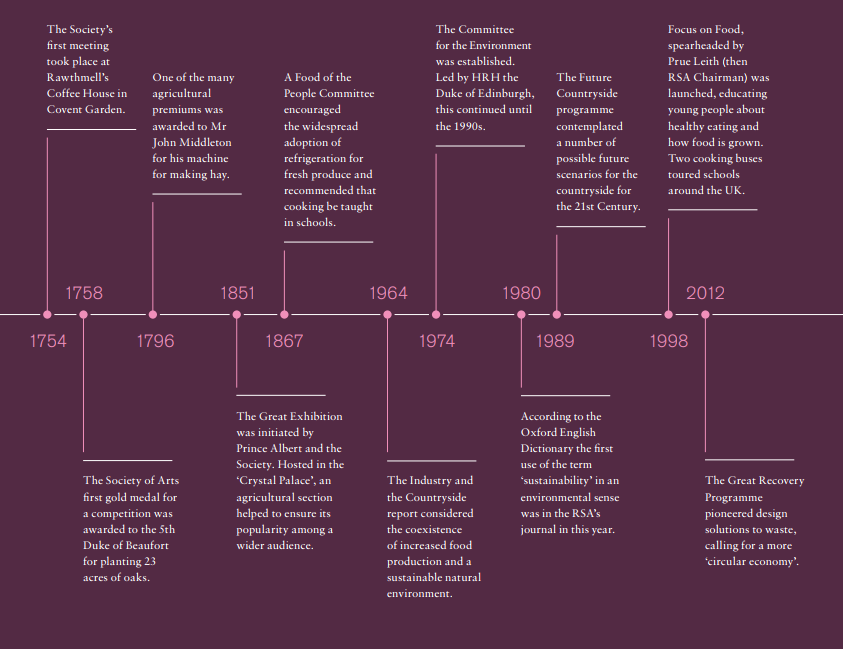Founded during the agricultural revolution, it is little wonder that the early focus of the Society was mostly on growing what was the most important part of the British economy, agriculture.
Premiums – a series of competitions with cash prizes – were dominated by agricultural matters with multiple awards given to individuals for helping to devise ways to produce crops quicker and more efficiently. From planting trees to improving agricultural machinery, the Society helped to drive forward what some refer to as the agricultural revolution.

The dominance of these industries in the Society’s thinking didn’t last forever but the consequences of rapid economic and agricultural expansion remained a theme throughout the RSA’s history and remains so to this day. Deforestation, soil erosion, and conservation were all topics that have been covered time and again in the history of the society as it attempted to devise solutions for the biggest issues of the day. In post-war Britain, efforts were again made to feed the growing population and the RSA was pivotal to this. Through the stewardship of the RSA’s President HRH the Duke of Edinburgh, there was a renewed focus on sustainability and the environment. Focus on Food was a major RSA project at the turn of the century, seeking to educate young people about healthy eating. In 2014 renowned food writer, Michael Pollan delivered a lecture at the RSA on cooking which was animated into an RSA Short.
Today, as we prepare to leave the EU and make big decisions on the future of food, farming and the countryside, things are uncertain. There are many opportunities as well as challenges ahead of us. Brexit can be a once-in-a-lifetime opportunity to transform the way this country feeds its people, and to think more carefully about protecting the environment and supporting rural communities. Many of the challenges we are facing right now are on the rise. Food poverty and diet related illness have increased; and while farm incomes rely on public subsidies, the countryside’s finite natural resources face pressure to provide economic, social and environmental value far beyond farming.
Currently UK farmers receive £3.2 billion worth of subsidies from the EU common agricultural policy (CAP) and it is unclear what the arrangements will be after this. Subsidies also support rural communities’ economies by providing jobs, trainings and development and if they are stopped, it is unclear how it will affect the life of these communities. During this challenging period, it is important to consult with those that are most affected by these changes but also more broadly with the wider population that is so affected through the food they eat. One way or another we all depend on the countryside, whether for the food we eat, water or the capacity of the earth’s natural systems to provide ecosystem goods and services. And in RSA style there will be a comprehensive programme of engagement, allowing people to get involved with the process and have their voices heard.
So it is fitting that in this tumultuous time, the RSA will return to its roots and has recently launched the Food, Farming and Countryside Commission. Over the next two years this project will focus on how we can achieve a safe, secure, inclusive food and farming system for the UK. One that leads to a flourishing rural economy and a sustainable and accessible countryside.

Be the first to write a comment
Comments
Please login to post a comment or reply
Don't have an account? Click here to register.